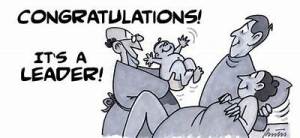Sometimes people will say about a person ‘he’s a born leader’ or ‘she’s a born teacher’. What they mean by this phrase is that the person seems effortlessly good at doing those things so that it is as if there has never been a time when they were not doing them.

There is some truth in the phrase, since there is no doubt that we are born with certain gifts and talents over which we have no real say. My son would probably be called a ‘born musician‘; he was born with perfect pitch, something that was manifest at a very early age (long before he could talk) when he would get very upset if music was played in ‘the wrong key’ or if songs were not sung ‘properly’ to him. (I reckon my failure to sing him to sleep with lullabies was because I didn’t sing them in the same key each time and therefore he was so irritated he did not sleep as a result!) This innate skill was not always appreciated by us in those early days; I remember an exceedingly tedious journey to Willington in Derbyshire when he was about fifteen months old when our lovely Michael W. Smith CD was inadvertently the source of much fractious crying (Michael W. Smith is especially fond of modulation (changing key) mid-song, which confused and irritated my son.) I know this with hindsight, incidentally; at the time I had no explanation for his constant crying!
But even though my son had the gift of perfect pitch, he had to be trained to be a musician: he had music lessons like anyone else; he had to learn to read music, learn Italian words, practise scales and learn the basics just like anyone else. His ‘birth skill’ had to be harnessed to a lifetime of practice; skill is never any substitute for hard work!
Jeremiah was called by God to be a prophet from a young age. Like Samuel, he’s a reminder to us that you don’t have to be an adult and qualified to be called by God. We could call him a ‘born prophet’ in the sense that it is God’s calling and shaping which form his destiny. At the same time, we see Jeremiah’s faithfulness and obedience are vital ingredients in the fulfilment of that calling.
Jeremiah did not feel up to the task which God gave him. His sense of inadequacy is one of the things which endear him to me; I think that I identify with Jeremiah and Gideon more than any other Biblical characters. Jeremiah’s response to God’s calling was, ‘Alas, Sovereign Lord, I do not know how to speak; I am too young.’ (Jer 1:6) You get the picture. ‘Sorry, God, but prophets have to talk to loads of people. I’m no good at that. I’m too young.’
Our sense of inadequacy is never the full story about us. Our identity ultimately is shaped by what God says about us – not what we think about ourselves or what others say about us. God’s assessment was that He had set Jeremiah apart for the work of a prophet through the most confused and chaotic decades of Israel’s history (as Eugene Peterson puts it) and because Jeremiah responded to God with obedience and faithfulness, this is what he became. A born prophet? Definitely. But a prophet by his participation in God’s assessment, rather than living by his own assessment and feelings.
Who we are is determined by God. Who we become is our gift to Him, as we respond in faith to the calling He gives us.

